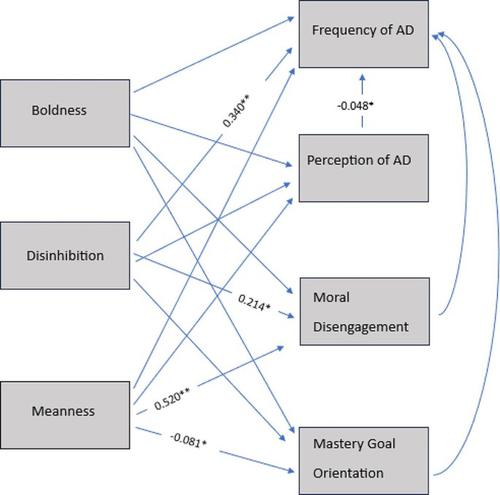Journal of Academic Ethics Pub Date : 2024-01-20 , DOI: 10.1007/s10805-024-09506-x Chiara Luisa Sirca , Eva Billen

|
This study conducted on a sample of 295 Dutch and Italian undergraduate and graduate students aims to investigate how psychopathic personality traits (meanness, boldness and disinhibition) may lead to cheating behavior, and to study whether there are correlations between psychopathic traits, motivation, moral disengagement, the perception of seriousness of academic dishonesty and frequency of academic dishonesty to try to better understand what causes students to cheat and engage in dishonest conduct. Results confirmed the key role of psychopathic traits, particularly the disinhibition aspect in predicting academic dishonesty. In addition, it was shown that students’ perceptions of what constitutes academic dishonesty and what does not are also important in predicting the frequency of dishonest behavior. Furthermore, the role of motivation and moral disengagement in predicting and mediating the relationship between traits of psychopathy and academic dishonesty were analyzed through mediation and regression analysis.
中文翻译:

预测学术不诚实:精神变态特征的作用、学术不诚实的感知、道德脱离和动机
这项研究以 295 名荷兰和意大利本科生和研究生为样本,旨在调查精神病态人格特征(卑鄙、大胆和去抑制)如何导致作弊行为,并研究精神病态特征、动机、道德脱离之间是否存在相关性。 ,对学术不诚实的严重性的看法和学术不诚实的频率,以试图更好地了解导致学生作弊和从事不诚实行为的原因。结果证实了精神病态特征的关键作用,特别是在预测学术不诚实方面的抑制解除方面。此外,研究表明,学生对什么构成学术不诚实和什么不构成学术不诚实的看法对于预测不诚实行为的频率也很重要。此外,通过中介和回归分析,分析了动机和道德脱离在预测和中介精神病特征与学术不诚实之间关系中的作用。



























 京公网安备 11010802027423号
京公网安备 11010802027423号